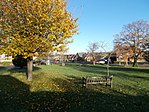The Isle of Wight (/waɪt/ WYTE) is an island, English county and unitary authority in the English Channel, 2 to 5 miles (3.2 to 8.0 kilometres) off the coast of Hampshire, across the Solent. It is the largest and second-most populous island in England. Referred to as "The Island" by residents, the Isle of Wight has resorts that have been popular holiday destinations since Victorian times. It is known for its mild climate, coastal scenery, and verdant landscape of fields, downland, and chines. The island is historically part of Hampshire. The island is designated a UNESCO Biosphere Reserve.
The island has been home to the poets Algernon Charles Swinburne and Alfred, Lord Tennyson. Queen Victoria built her summer residence and final home, Osborne House at East Cowes on the Isle. It has a maritime and industrial tradition of boat-building, sail-making, the manufacture of flying boats, hovercraft, and Britain's space rockets. The island hosts annual music festivals, including the Isle of Wight Festival, which in 1970 was the largest rock music event ever held. It has well-conserved wildlife and some of Europe's richest cliffs and quarries of dinosaur fossils.
The island has played an essential part in the defence of the ports of Southampton and Portsmouth and has been near the front line of conflicts through the ages, having faced the Spanish Armada and weathered the Battle of Britain. Being rural for most of its history, its Victorian fashionability and the growing affordability of holidays led to significant urban development during the late 19th and early 20th centuries.
The island became a separate administrative county in 1890, independent of Hampshire. It continued to share the Lord Lieutenant of Hampshire until 1974, when it was made a ceremonial county in its own right. The island no longer has administrative links to Hampshire. However, the two counties share their police force and fire and rescue service, and the island's Anglican churches belong to the Diocese of Portsmouth (originally Winchester). A combined local authority with Portsmouth and Southampton was considered as part of a regional devolution package but was subsequently rejected by the UK government in 2018.The quickest public transport link to the mainland is the hovercraft (Hovertravel) from Ryde to Southsea. Three vehicle ferries and two catamaran services cross the Solent to Southampton, Lymington, and Portsmouth via the island's largest ferry operator, Wightlink, and the island's second-largest ferry company, Red Funnel. Tourism is the largest industry on the island.








